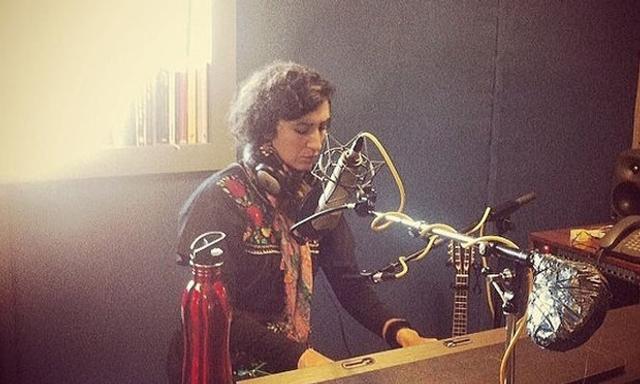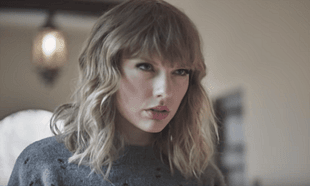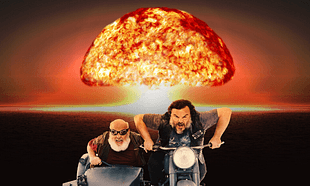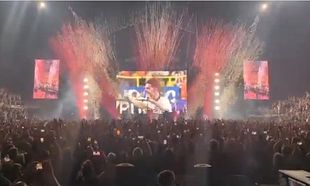Growing up as she did in a family full of natural performers- musicians and magicians, no less- Mama Kin (Danienlle Caruana) couldn't help but join the family business. On 'The Magician's Daughter', her fourth record, the Australian singer- songwriter has made a lush, warm- sounding, summer record full of layers of musical arrangements.
Ahead of her first Irish tour, during which she performs as part of a duo, Caruana spoke to Phil Cummins about the importance of the great outdoors to her writing process, incorporating her colourful family history into her songs and her curiosity about Irish folk music and storytelling.
'The Magician's Daughter' is such a natural, warm- sounding album, reminiscent of the good old days of analogue tape recording.How did you achieve that sound on the record?
I have Jan Skubiszewski to thank for the sound of the record. He's an incredibly cinematic person. He goes for a very broad sound that has great width and depth to it and that has so many dimensions. That's what struck me with the sounds that he was getting early on in the process. For this record, more so than the last record, I brought in songs to the band that were raw as I didn't want anyone to interpret them as we might, live. I wanted them to interpret them as stories for which we were painting a picture. Jan had a visual aesthetic to how he recorded; this sense of depth and width to what we wanted to achieve.
What kind of records were you listening to during the writing and recording of the record?
I was listening to Joan As A Policewoman and I was also listening to Laura Marling; I was trying to get that atmospheric sound that she creates. I was also listening to this great compilation record called Saturday Night Fish Fry, a compilation out of New Orleans, which I was listening to mostly for drum grooves and sounds. It's a really old- school, New Orleans record. All the drum takes sound like loops, but there's too many fills and too much flair for them to be loops. Between those two very broad extremes was the record that I wanted to make.
You mention New Orleans: Nick Cave has often spoken of the thin line between the rugged, physical landscape of Australia and that of America. How much of that comes though on the record? There are undertones of Americana throughout 'The Magician's Daughter'...
I think that feel is probably coming my brother, Michael, who plays keys on the record and is a huge musical influence on me. He's 17 years my elder so I've had his musical sensibilities embedded on me all of my life. He's heavily influenced by artists like Stevie Wonder, Dr. John, Ray Charles: that's his world of music. So I think that when we mix that sensibility with my love for artists like Gillian Welch, Aretha Franklin, Bonnie Raitt. We have the same musical language even though we're approaching the song from different places. So making music with him is inspiring.
As for the physical landscape...I'm always tapping into that sense of open space, that harsh dynamic in our country. It's interesting though: Michael lives on the east coast, where we're from, and I've lived on the west coast of Australia for about 8 years. I am very much shaped by my environment.
How important is the outdoors to you during the writing process? From listening to the record, I get the feeling you're not sitting indoors, staring at screens...
It's hugely important: I'm the kind of person that if I wasn't getting my daily injections of nature that I wouldn't be able to create anything. So there's a sense of almost dead calm, that space that nature affords me in my life. 'Red Wood River', for example, was written after I'd gone on a camping trip by a river and I had all these visual ideas of being swallowed by a river; what is it to be inhaled by a river? These were all things that triggered how I write.
So the relationship between nature and natural places and us as humans to be creative is so completely intrinsic that I think it could be a problem with the next generation of kids that are coming though, which is why my parental philosophy is very much embedded in minimal screen time, how are we expressing ourselves, learning to be on your own...we're such a stimulus addicted generation. I feel myself reaching for my phone even though I don't really need it! Seeing that relationship play out with children is frightening.
You come from a long line of musicians, with four of your siblings working as professional musicians. Has it ever gotten competitive or it very much collaborative?
Quite the opposite! I had a long time of not sharing my music as I didn't think that I was good enough. My brothers were always encouraging me, asking me where I was in the development of my songs. At the first whisper that I would develop my own songs, they were proactive in helping me. In fact, when I was playing my first shows on my first tour, my brother sat in on the rehearsals on some of the songs and in the space of one rehearsal he ended up playing on 90% of the set and since then we've been playing together.
Taking my songs to him was scary but enlivening. He breathed new life into the songs that no- one else could have breathed because of how I know him.
And when you're at home, writing and demoing new songs, do you work mostly on your own or do you work collaboratively with your husband (musician John Butler)?
Sometimes, primarily when we're co- writing. But writing for me is a very private, solo experience. And I don't really ever want to share until I'm totally sure of what it is that I have and I think that doing that too early can be a very damaging thing. You need the shape of the song to come out before you can have someone else add there perspective to how they see it. The song has to get to a certain point of maturity before I start showing it to someone else.
Are you always able to judge when the song is finished and ready to be shared with other musicians?
I know when to ask for feedback! As far as knowing when it's ready? Yeah, I think I have a good sense of when it's ready. In the song- writing process, I can feel when a section is too long or too short. Recording is harder for me, though. I had a interesting experience with 'The Magician's Daughter' in that when we finished adding all the layers and getting that lushness of sound, we were getting ready to tour the first single. Before we set out to tour, my brother injured himself in a motorbike accident, so he couldn't come out on the road. So I went on tour as part of a duo, which is how I'll be playing these shows in Ireland.
I was absolutely petrified having spent months crafting all these layers and arrangements and then having to rely on the rhythmic, bare bones of the song, on stage, during the tour. I can't wait to that again on these Irish shows, because it proves whether or not the songs still stands on their own merit.
Did you find that stripping down the songs to their bare bones limited your choices as a performer or did you find it empowering?
It encouraged me to dig deeper: I had to dig deeper in terms of my singing, in terms of my playing, in terms of the delivery. It made me work more with the subtleties of the song. When you're playing in solo or duo form, you have to create a space where people cannot resist but walk into. It's a very different practice. I love the feeling of being on stage with a band and having that collective energy, but I also love the feeling of being on stage on my own and having to hold that energetic space and play with it between me and the audience. I'm honoured that I think that my songs work in both settings.
Are the dynamics of solo shows demanding? Solo / duet performers such as Richard Thompson, Wilco's Jeff Tweedy and Gillian Welch have mastered it...
Gillian Welch is incredible. Both she and David Rawlings are so completely present to the song. When Gillian sings a song she is so in that song that you can't help but be there with her: there's nowhere else that you could be. She fills the room with the presence of the song, which is why I find performing so addictive. You have an hour and a half to share your ten or twelve stories with strangers in a room and somehow, within that dynamic, you have to find a place where, all of a sudden, this thing is intimate- where songs of mine such as 'Red Wood River' or 'Cherokee Boy' connect and people see themselves in the songs. But that can only happen when you fill the room with your song; you fill that space.
That's part of the reason why the record is called 'The Magician's Daughter': it's alchemy to in this art form and to be able to do what it is I do. I love it, but I take it very seriously and you have to be able to sit in the centre.
Familial relationships play a big part in your music: your brother plays in your band, the album is titled in tribute to your mother and you've written about your grandfather who was a professional magician in post- WW2 Malta. Some artists have caused rifts in their own families for delving their family history for creative purposes and sharing that history with an audience: has that ever been a problem for you?
It was never a question. As a family we were always very musical, so everything we did was articulated and punctuated through music: there was no separation between my family and my musical life: to separate the two would be like losing a child. I can't fathom it. Interestingly, I'm the only one in my family who writes the way I write: I'm the only storyteller in my family.
On my first record, I wrote a song called bitter tears, which is about my father's relationship with his father. It was in me to write that song: my father's relationship with his father affected his relationship with me, so of course, I felt that I had to write that song. But, I took it to him to show it to him and get his feedback. He said "Stop, stop, stop: tell me the words." When I read him the lyric, he was shocked and asked me if I intended to play the song in front of an audience. I told him that I did and he let it go. I played it, live, at some shows, but the next time he saw me play he specifically asked me not to perform the song. I was so shocked as I thought that I had been writing the song for him as a gift. But I understood that there was discretion there for him that there wasn't there for me. For me, my music is my vulnerability and that's why it's powerful; for him vulnerability isn't powerful: it's the kind of thing that he avoids. It was a very interesting process.
How aware are you of the storytelling telling traditions and the folk traditions in Irish music and Irish culture?
Not as much as I'd like, but I did once travel across Australia with a girl from Dingle, so I get the sense of humour, the incredible importance of music, the importance of oral storytelling tradition, and this being my third time here, the time that people are willing to invest in engaging in a yarn. We meet in a lot of ways, the Australians and the Irish.
There's a strong musical connection, too: Steve Cooney has lived in Ireland for some time, now, and he's brought something very special to the Irish music scene. Shane Howard, an Australian artist, has very strong ties with Ireland and he's constantly travelling back and forth, and his work with Mary Black brings him over and back. There's also the Port Fairy folk festival, which this year featured Glen Hansard and Lisa O'Neill, who I think is just great. So when I see these performers, I see what it is that I like to bring to my own shows: this dedication to the song, to the story and a dedication to deliver it fiercely. I get the same thing with Kila, so I have a great deal of respect and admiration for the culture.
So what can expect from the shows on your Irish tour?
There's always been three or four territories outside of Australia that I've always wanted to play. I've chosen them specifically as I feel that they are the territories that will understand stories and get what the back story is about to a song. The Irish, I feel, have a real grittiness to their culture, to their way. And yet it's surrounded by great wit and comedy, and I think that's exactly what I try to do. I try to get into the dirge of the human condition and add some humour.
What you can expect, I hope, is someone telling stories, being honest. I don't take anyone coming to a show, lightly. There's so much anyone could be doing on any night in Dublin. So for someone to choose to buy a ticket for one of my shows, I'm on the stage to repay that debt. I don't take audience attendance lightly. I expect them to leave feeling affected.
Mama Kin plays The Set Theatre, Kilkenny on Sat 26 April, McCarthy's in Dingle on Sun 27 April, Whelan's in Dublin on Tues 29 April and De Barra's in Clonakilty, Cork on Wed 30 April.









































































